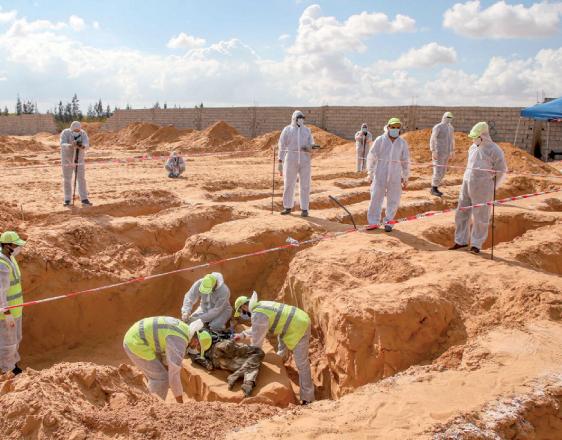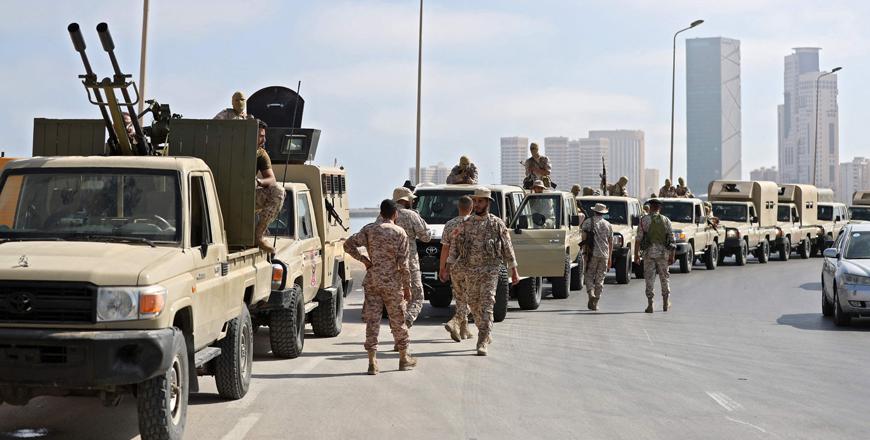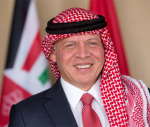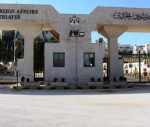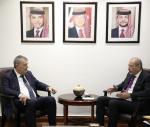You are here
Former minister warns Libya not to delay vote
By AFP - Jun 02,2021 - Last updated at Jun 02,2021
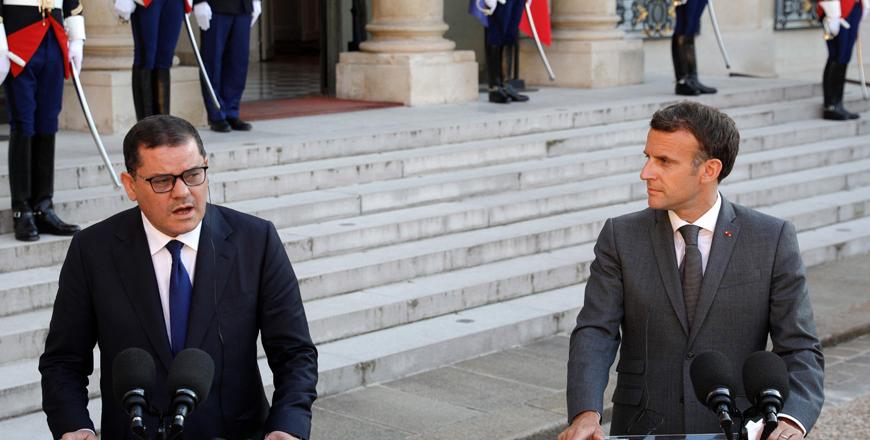
Libya’s Interim Prime Minister Abdul Hamid Dbeibah (left) and French President Emmanuel Macron give a speech at the Elysee Palace in Paris, on Tuesday, after their meeting (AFP photo)
BRUSSELS — Libya’s former interior minister — a probable presidential candidate — has warned Tripoli’s transitional government not to delay elections as the strife-torn country seeks a return to peace and security.
In an interview with AFP, Fathi Bashagha — who left the government in March but is still an influential figure — said only that he was “still thinking” about a possible presidential run.
But he added that, 10 years after the overthrow of dictator Muammar Qadhafi and with UN-sponsored peace talks underway, Libyans are “optimistic about the future” and ready to build “a strong state”.
And he stressed that, as a former interior minister, he has “statecraft-related experience, first and foremost in the field of security”.
“We have to attach great importance to the stabilisation of the country and to our security,” he told AFP, criticising Libya’s current transitional government for failing to exert control over armed factions.
Libya’s transitional government under Prime Minister Abdul Hamid Dbeibah and a presidential council headed by Mohammad Younes Menfi is engaged in a UN-sponsored peace process and has promised to hold polls.
Germany will host a new set of talks in Berlin in three weeks’ time, focused on preparations for a national vote on December 24 and the withdrawal of foreign forces from the country after a decade of violence.
There has been a formal truce in the country since October, but the UN envoy for Libya, Jan Kubis, has warned that progress on pulling out foreign forces and uniting divided institutions has stalled.
Bashagha, a 58-year-old former air force officer who joined the revolt against Qadhafi’s regime as a member of the Islamist-led Misrata military council, placed the blame for the delay on the government.
“Now, it is clear that the present government would prefer not to have elections. But this is a commitment which has to be brought to completion,” he told AFP.
“So as far as the elections are concerned, the parliamentary and the presidential elections will take place simultaneously and, for the first time, the president will be elected by direct vote.”
Migrants bombed
Bashagha is on a tour of European capitals and was in Brussels to meet members of the European parliament and NGO leaders to talk about the future of his country — while discreetly pushing his own credentials.
Brussels is most concerned about the problem of would-be migrants and refugees leaving Libya’s shores — often on overloaded and unsafe smuggling ships — bound for European Union countries.
The former Libyan minister stressed that he had taken this issue seriously when in office but warned that it was best dealt with by a unified Libyan government.
“We cooperated with the European Union in this field, despite the difficult conditions,” he said, noting that migrant retention centres had been bombed during a rebel assault on Tripoli last year.
The Berlin peace talks later this month will deal with the urgency of foreign forces — such as Russian mercenaries backing eastern strongman Khalifa Haftar — leaving the country.
But Bashagha defended the presence of the Turkish forces that he said had helped the authorities in Tripoli defend the capital from forces loyal to Haftar — who may himself become a rival presidential candidate.
He noted that it was the former Libyan government under then prime minister Fayez Al Sarraj that had requested Turkish support “to help with the defence of Tripoli”.
“And indeed, owing to the Turkish help, it was possible and to defend the city and the attack failed,” he said.
Strong state
“And now, in Libya, we can notice that Libya is advancing towards peace, and it’s putting an end to the war. This requires the absolute condition of organising elections. This will bring about security and peace.”
He warned the current government not to “put obstacles” in the way of elections, which he insisted would be supported by Libyans from across the country after a decade of chaos.
“After the fall of Qadhafi, we know that weapons started to proliferate, and they fell into the hands of criminal groups and factions,” he told AFP.
“And there are obstacles, there are risks. But I think that this willingness of our people — of all our people — will help to solve the problems and to build the state, a strong state.”
Related Articles
TARHUNA, Libya — Seventeen bodies have been unearthed in newly found mass graves in western Libya’s Tarhuna region, taking the total exhumed
TRIPOLI — Gunfire rocked Libya's capital for several hours on Tuesday as a rival prime minister attempted to oust interim premier Abdulhamid
TRIPOLI — The powerful interior minister of Libya’s unity government survived an assassination attempt Sunday, an aide said, sparking fears


